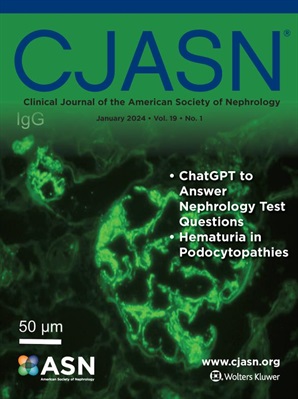A Home Hemodialysis Objective Structured Clinical Examination (OSCE) for Formative Assessment of Nephrology Fellows.
IF 8.5
1区 医学
Q1 UROLOGY & NEPHROLOGY
Clinical Journal of the American Society of Nephrology
Pub Date : 2025-05-21
DOI:10.2215/cjn.0000000740
引用次数: 0
Abstract
BACKGROUND The Accreditation Council for Graduate Medical Education requires graduating nephrology fellows demonstrate competence in home hemodialysis (HHD). Because low patient numbers may lead to training gaps, clinical experience may be enhanced using simulation. We designed and preliminarily validated a formative objective structured clinical examination (OSCE) assessing clinical care of an uncomplicated patient initiating HHD, using a unified model of construct validity. METHODS The OSCE was developed by a nephrology fellow and five faculty (three practicing HHD). The nine-member test committee (five in HHD practice; one HHD care partner) assessed test item difficulty/relevance and determined passing scores. The final test consisted of 27 items (31 possible points); seven were evidence-based/standard-of-care questions (9.5 possible points). Passing score was 20 out of 31 points (65%). Median relevance for all items was "important" or "essential". Content validity index was 0.84. On preliminary validation by 11 board-certified volunteers (four practicing HHD), overall mean±SD score was 27.5±2 (100% passing); kappa=0.83 [95% confidence interval (CI) 0.67-0.99]. Validator evidence-based question score was 9.0 ± 0.6 . RESULTS Thirty-eight fellows (nine programs, 21 first-year; 17 second-year) were tested. Seventy one percent passed (Cronbach's alpha=0.70). Fellows' mean±SD scores were lower than validators: 21.5±4.0 vs. 27.5±2, p<0.001, as were their scores on evidence-based questions: 7.4±1.4 vs. 9.0±0.6, p<0.001. Eighty-eight percent of evidence-based/standard-of-care questions were answered correctly by validators vs. 62% by fellows; p <0.001. Forty-two percent of fellows were able to name four potential benefits and two risks associated with HHD; 79% recognized that the primary risk of buttonhole cannulation was infection. Seventy-four percent correctly identified minimum single pool Kt/V for thrice-weekly hemodialysis, and 29% knew the minimum standard weekly Kt/V target. Eighty-eight percent of fellows surveyed (22 out of 25) agreed/strongly agreed that the OSCE was useful in self-assessing proficiency. CONCLUSIONS The OSCE may be used as a formative assessment of fellow proficiency in prescribing HHD.家庭血液透析目的结构化临床检查(OSCE)对肾脏病研究员形成性评估。
研究生医学教育认证委员会要求毕业的肾脏学研究员证明家庭血液透析(HHD)的能力。由于患者数量少可能导致培训差距,临床经验可以通过模拟来增强。我们设计并初步验证了一项形成性客观结构化临床检查(OSCE),该检查使用统一的结构效度模型来评估一名简单的HHD患者的临床护理。方法OSCE由1名肾病学研究员和5名教师(3名执业HHD)共同开发。9人测试委员会(HHD实践5人;一名HHD护理伙伴)评估测试项目的难度/相关性并确定及格分数。最终测试包括27个项目(31分);7个是循证/标准护理问题(9.5分)。满分为31分,合格率为20分(65%)。所有条目的中位数相关性为“重要”或“必要”。内容效度指数为0.84。经11名委员会认证志愿者(4名执业HHD)初步验证,总体平均±SD评分为27.5±2分(100%通过);kappa=0.83[95%置信区间(CI) 0.67 ~ 0.99]。验证者循证问题得分为9.0±0.6。结果38名研究员(9个项目,21名一年级学生;17名二年级学生接受了测试。71%通过(Cronbach’s alpha=0.70)。研究人员的平均±SD得分低于验证者:21.5±4.0比27.5±2,p<0.001,他们在循证问题上的得分也低于验证者:7.4±1.4比9.0±0.6,p<0.001。验证者正确回答了88%的循证/标准护理问题,而研究员正确回答了62%;p < 0.001。42%的人能够说出与HHD相关的四种潜在益处和两种风险;79%的人认为扣眼插管的主要风险是感染。74%的人正确识别了每周三次血液透析的最低单池Kt/V, 29%的人知道最低标准每周Kt/V目标。88%接受调查的研究员(25人中有22人)同意/强烈同意欧安组织在自我评估能力方面是有用的。结论:欧安组织可以作为对处方HHD的熟练程度的形成性评估。
本文章由计算机程序翻译,如有差异,请以英文原文为准。
求助全文
约1分钟内获得全文
求助全文
来源期刊
CiteScore
12.20
自引率
3.10%
发文量
514
审稿时长
3-6 weeks
期刊介绍:
The Clinical Journal of the American Society of Nephrology strives to establish itself as the foremost authority in communicating and influencing advances in clinical nephrology by (1) swiftly and effectively disseminating pivotal developments in clinical and translational research in nephrology, encompassing innovations in research methods and care delivery; (2) providing context for these advances in relation to future research directions and patient care; and (3) becoming a key voice on issues with potential implications for the clinical practice of nephrology, particularly within the United States. Original manuscript topics cover a range of areas, including Acid/Base and Electrolyte Disorders, Acute Kidney Injury and ICU Nephrology, Chronic Kidney Disease, Clinical Nephrology, Cystic Kidney Disease, Diabetes and the Kidney, Genetics, Geriatric and Palliative Nephrology, Glomerular and Tubulointerstitial Diseases, Hypertension, Maintenance Dialysis, Mineral Metabolism, Nephrolithiasis, and Transplantation.

 求助内容:
求助内容: 应助结果提醒方式:
应助结果提醒方式:


